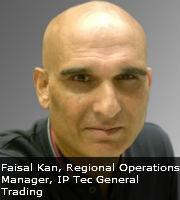The Middle East has returned to many MNCs’ and investors’ radar once again, with business potential emanating from the United Arab Emirates to neighboring countries and northern Africa. This feature looks into the various growth markets and their opportunities for security solutions providers — carpe diem, seize the day, seize the region!
The Middle East has returned to many MNCs' and investors' radar once again, with business potential emanating from the United Arab Emirates to neighboring countries and northern Africa. This feature looks into the various growth markets and their opportunities for security solutions providers — carpe diem, seize the day, seize the region!
Long gone are the days of the 2008/2009 financial crisis. Infrastructure projects, financial hubs and recreational parks are once again being built in the Middle East. Among the hustle and bustle, the countries of the Gulf Cooperation Council (GCC), in particular the United Arab Emirates (UAE), Qatar, Saudi Arabia and Kuwait, still boast the most momentum. According to IMS Research (an IHS company), the regional video surveillance equipment market in 2013 alone will exceed US$320 million.
Not surprisingly, most of the money goes into tourism-related industries. Beyond the UAE, Saudi Arabia, Qatar, Turkey, Oman, Kuwait and Iran are also growing by leaps and bounds, thanks largely to infrastructure projects. Qatar, for example, has seen a flurry of subway and light rail projects, as well as museums and hotels. “Qatar is growing at a fast pace and is set to host the 2022 FIFA World Cup, thus driving continued security system investments among others,” said Hidenori Taguchi, Head of Marketing for B2B Products, MEA Professional Solutions, Sony Corporation.
Turkey, Oman, Kuwait and Iran are also growing by leaps and bounds, thanks largely to infrastructure projects. Qatar, for example, has seen a flurry of subway and light rail projects, as well as museums and hotels. “Qatar is growing at a fast pace and is set to host the 2022 FIFA World Cup, thus driving continued security system investments among others,” said Hidenori Taguchi, Head of Marketing for B2B Products, MEA Professional Solutions, Sony Corporation.
"Many projects in this region are driven by new construction or new infrastructure initiatives, which are generally a mixture of government and commercial construction projects," said Tarek Ismail, Sales Director for the Middle East, Tyco Security Products. "Other dynamic vertical markets are the higher education market, being buoyed by some very large university projects, along with rapidly growing retail and aviation markets. For 2013, many customers are encouraged by the commitments Saudi Arabia's King Abdullah has made for infrastructure projects."
Dubai the Hub
 Business done in Dubai can radiate to the rest of the region, north and east Africa, as well as India and Pakistan. Dubai is recovering, said Ali Boussi, Regional Sales Manager of Business Automation and Security Systems. "Sales come not only from the UAE, but from all GCC members and northern Africa as well. People in Dubai and the UAE have a greater understanding and higher acceptance of new technology and products, in turn giving them more value considerations and propositions when compared to the other countries in the region. Moreover, the government is usually a pioneer in implementing security regulations on and measures in commercial buildings.Business models and requirements from MNCs often become benchmarks. "Our business strategy is to provide blanket coverage of quality products, combined with a proficient level of customer support," said Faisal Kan, Regional Operations Manager, IP Tec General Trading.
Business done in Dubai can radiate to the rest of the region, north and east Africa, as well as India and Pakistan. Dubai is recovering, said Ali Boussi, Regional Sales Manager of Business Automation and Security Systems. "Sales come not only from the UAE, but from all GCC members and northern Africa as well. People in Dubai and the UAE have a greater understanding and higher acceptance of new technology and products, in turn giving them more value considerations and propositions when compared to the other countries in the region. Moreover, the government is usually a pioneer in implementing security regulations on and measures in commercial buildings.Business models and requirements from MNCs often become benchmarks. "Our business strategy is to provide blanket coverage of quality products, combined with a proficient level of customer support," said Faisal Kan, Regional Operations Manager, IP Tec General Trading. 
Saudi Arabia
Saudi Arabia is the next star to watch. Its stable financial structure and abundant natural resources supported steady growth even during the global recession. "We forecast that the Saudi Arabian market will continue to see strong growth in 2013," said Oliver Philippou, Market Analyst in the Video Surveillance and Security Group of IMS. "This trend will continue through 2015 where it is predicted that Saudi Arabia will overtake the UAE to become the second largest market in the region, after Turkey. Saudi Arabia historically set conservative annual oil production forecasts, leaving surplus funding for social spending, including infrastructure and health care projects."
 "Saudi Arabia's construction sector is expected to go through a period of accelerated growth during the next few years, with the value of projects estimated at $629 billion," said Paul Ramsay, International Sales Director for Norbain. "More than $500 billion of investment opportunities in energy, transportation, education, health care, and other vital economic sectors are among established projects, making the kingdom a leading investment hub for construction work. The kingdom is considered to be the region's top economy, with a growing large young population and highly competitive business environment and national initiatives in infrastructure development."
"Saudi Arabia's construction sector is expected to go through a period of accelerated growth during the next few years, with the value of projects estimated at $629 billion," said Paul Ramsay, International Sales Director for Norbain. "More than $500 billion of investment opportunities in energy, transportation, education, health care, and other vital economic sectors are among established projects, making the kingdom a leading investment hub for construction work. The kingdom is considered to be the region's top economy, with a growing large young population and highly competitive business environment and national initiatives in infrastructure development."
Turkey
After years of mounting difficulties which brought Turkey close to economic collapse, a tough recovery program was agreed with the International Monetary Fund in 2002, Philippou said. "The austerity measures imposed then meant that by the time the global financial crisis came round in 2008, Turkey was in a better position to weather the storm than many other countries. The level of public debt was already relatively low, and although the effects of the recession were still felt, by 2010 the Turkish economy had started to bounce back — to the extent that by the beginning of 2011, concerns were being raised over whether the boom was sustainable. Taking advantage of this economic prosperity, Turkey has some large infrastructure programs planned to support its economic growth. As traffic between the E.U. and Turkey is expected to increase substantially by 2020 (Global Construction 2020, with the potential membership of the E.U.), Turkey's transport network needs to be substantially upgraded to meet minimum standards. Traffic monitoring, government, railways and commercial sectors are all forecast to grow strongly in Turkey to 2016."
Kuwait & Iran
Aside from Qatar, Kuwait and Iran are two others that are forecast to grow the quickest. Kuwait is currently seeing some very large banking projects and an accelerated rate of transition to network video surveillance. Iran, with an already large analog install base, will be one of the few countries not to see a decline in its analog CCTV market. This, combined with some large city surveillance projects, will drive growth in these markets at CAGRs of 14 and 18 percent, respectively. However, it should be noted that these two markets are relatively small when compared to the others in the region, Philippou said.